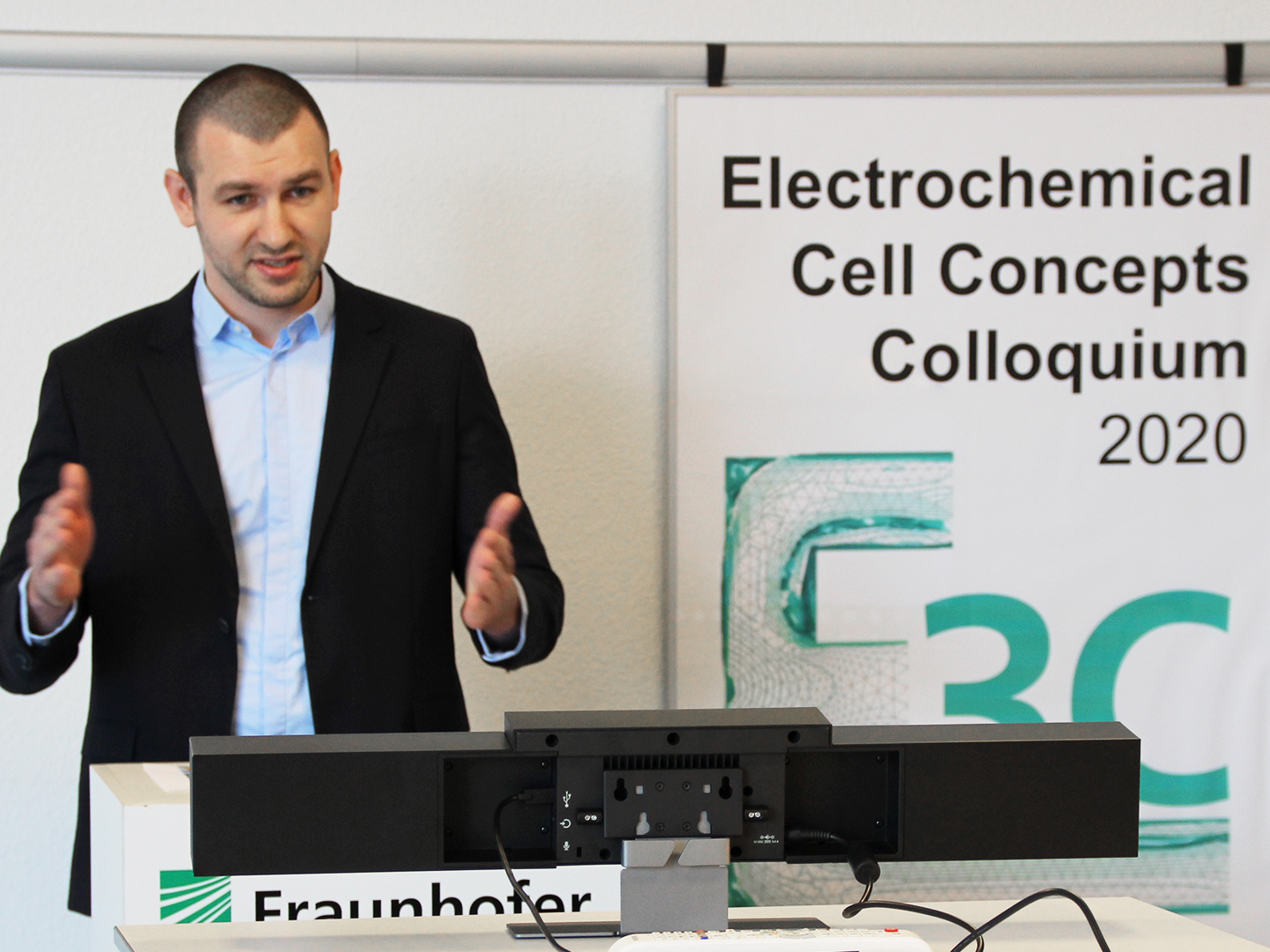Virtual "Electrochemical Cell Concepts Colloquium”
Successful premiere for E3C: Researchers from all over the world discussed cell concepts of electrochemical reactors
Provide a platform for the interdisciplinary exchange in the field of electrochemical cells – with this objective Jan Girschik started planning the first ˮE3C – Electrochemical Cell Concepts Colloquiumˮ. The scientist from the Fraunhofer Institute for Environmental, Safety, and Energy Technology UMSICHT has definitely achieved this goal: over 130 researchers from 13 countries – including Canada, the USA, Uruguay, India, Greece, Great Britain and seven other European nations – took part in the online event on May 14 2020. Their presentations and discussions revolved around commonalities and potential combinations of cell concepts and fluid flow systems for flow batteries, fuel cells, electrolysis, electrosynthesis and electrodialysis cells.



“As an electrochemistry engineer it’s a great pleasure to be able to focus on cell design aspects. It’s a topic that perhaps doesn’t get the attention it deserves. Particularly in academia.“ Prof. Edward Roberts opened his keynote talk with these words. The scientist from the University of Calgary provided a thematic classification and presented the basics of electrochemical cell design, water treatment and energy storage. In his luggage, for example, he had a photo of a 19th century “voltaic stack“ and placed it next to the photo of a bipolar stack of today. His comment: “As you can see, we have made enormous progress in electrochemical cell design.“
Edward Roberts used the examples of some “wacky ideas“ that he and his team are currently working on to illustrate the direction in which future developments could take us. These include complex cells with moving packed bed electrodes, oscillating fluid flow and magnetic fields.
New ways to design electrodes
Prof. Matthias Wessling also presented innovative ideas. The scientist from RWTH Aachen University gave the second keynote talk entitled “Free form fabrication of electrochemical membrane reactors“ and emphasized: “The integration of reaction and separation systems for electrodes is a wonderful scientific playground for electrochemical engineers.“ Among other things, nickel-based anodes for the oxidation of lignin have been developed on the Aachen playground – in the form of ceramic membrane tubes. According to Matthias Wessling, these can be produced by 3D printing, selective laser sintering and laserless additive manufacturing, for example.
In order to stimulate the creativity of the participants with regard to the design of electrodes, he also presented various forms that he and his team work with. Finally, he discussed tubular reactors and the use of flow-through and slurry electrodes.
The successful exchange on the design of electrochemical reactors will be repeated in 2021
The keynotes were followed by further presentations in three sessions: The focus of “Cell design and fluid flow“ was on innovative cell concepts and fluid flow of different types of reactors. The session “Functional components“ focused on membranes and porous electrodes, while the session “Stack design, testing and sealing technology“ was primarily concerned with the bipolar design of electrochemical reactors. The speakers came, among others, from the Institute for Microsystems Technology IMTEK, the Karlsruhe Institute of Technology, the DECHEMA Research Institute, the Hamburg University of Applied Sciences, the Center for Solar Energy and Hydrogen Research Baden-Württemberg, Clausthal University of Technology, ZBT GmbH, the Fraunhofer Institute for Interfacial Engineering and Biotechnology IGB and UMSICHT.
The organizer was completely satisfied with the course and result of the virtual “E3C – Electrochemical Cell Concepts Colloquium“. “I think all participants got new impulses for their research work“, was Jan Girschik's conclusion. “So the premiere was a complete success that we would like to repeat in 2021. Then hopefully on site in Oberhausen and with the option of personal networking between the sessions.“ He announced the call for papers for September 2020.
Further Information
Competencies of Fraunhofer UMSICHT
Last modified:
 Fraunhofer Institute for Environmental, Safety and Energy Technology UMSICHT
Fraunhofer Institute for Environmental, Safety and Energy Technology UMSICHT